The U.S. drugs watchdog has announced it will more closely scrutinize imports of xylazine after the animal tranquilizer has turned up in illicit drug supplies and been implicated in overdoses and severe skin conditions.

Animal sedative has been found in illegal drug supplies
The Food and Drug Administration said its action would restrict the unlawful entry of xylazine and its active pharmaceutical ingredients into the U.S. while ensuring veterinarians can still access supplies of the substance.[1]
Xylazine is a non-opioid tranquilizer used as a sedative and anesthetic for large animals such as deer and horses. It’s not approved for use in humans, but has been identified as an adulterant in opioid supplies, known by the street names “tranq dope,” “zombie drug,” and “Philly dope.” It’s also been detected in samples of cocaine and meth.
A powerful sedative, xylazine can depress breathing, blood pressure, heart rate, and body temperature to dangerous levels, especially when used in combination with fentanyl and other opioids.
Additionally, users can develop patches of ulcerated and narcotic skin, some severe enough to cause life-threatening infections and require amputation. While these often occur at sites of injection, they can also appear in other areas of the body, a consequence of the drug’s restriction of blood and oxygen flows to the skin.
Many people exposed to xylazine will be so unwittingly, unaware that it’s been cut into their drug supplies.
FDA will be able to detain shipments of xylazine
The FDA has already alerted healthcare professionals about the risks of xylazine in drug-using patients, including that its effects in overdose can’t be reversed through the opioid antagonist Narcan.[2]
Now the regulator is acting to restrict the entry of the drug into the U.S. and illicit drug supply chains. Under the import alert, xylazine presented for entry into the U.S. will be subject to heightened scrutiny from the FDA.
FDA staff will be able to detain shipments that appear to violate the law. As part of this entry review, staff will consider evidence from importers that their product is properly labeled, not adulterated, and for genuine veterinary use.
“The FDA remains concerned about the increasing prevalence of xylazine mixed with illicit drugs, and this action is one part of broader efforts the agency is undertaking to address this issue,” FDA Commissioner Robert M. Califf, M.D. said. “We will continue to use all tools at our disposal and partner with the Drug Enforcement Administration and other federal, state, local agencies and stakeholders as appropriate to stem these illicit activities and protect public health.”
That includes the criminal prosecution of people selling xylazine-cut drugs in-person and online.
Vets will continue to have access to the substance
The FDA will also coordinate with animal health stakeholders to ensure drugs containing xylazine are available for appropriate veterinary use.
“We recognize the public health effects of xylazine tainting these illicit drugs and are continuing to ensure that legitimate product is restricted to veterinary use only,” Tracey Forfa, J.D., director of the FDA’s Center for Veterinary Medicine, said.
Xylazine is legal in the U.S. only for use by veterinarians. However, it’s not yet regulated as a drug of abuse under the federal Controlled Substances Act.

-blog-detail.jpg?v=1722513508)

-blog-detail.jpg?v=1722513518)